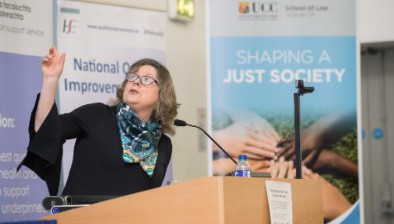Court of Appeal: Solicitor criticised for pursuing appeal on behalf of ward of court without authority

The Court of Appeal has dismissed an appeal which was brought by a solicitor purporting to act on behalf of a ward of court. The court held that the legal practitioners did not have any lawful authority to pursue the appeal after the man had been brought into wardship, which related to the costs of the High Court proceedings. No consent had been obtained from the General Solicitor and the appeal continued to be pursued after the death of the ward.

About this case:
- Citation:[2022] IECA 228
- Judgment:
- Court:Court of Appeal
- Judge:Ms Justice Máire Whelan
Delivering judgment in the case, Ms Justice Máire Whelan stated that, as a matter of law, the legal practitioners did not have instructions or a client and therefore had no standing to pursue the appeal. Further, the ward’s estate had been exposed to the risk of further costs based on the misconceived appeal.
Background
In October 2018, the ward (Mr TH) was admitted to hospital and diagnosed with significant advanced vascular dementia. He was later admitted to a nursing home, where he sustained a fall and fractured two vertebrae. He died in April 2021.
In December 2018, the Health Service Executive invoked the 12th section of the Lunacy Regulation (Ireland) Act 1871 which initiated the wardship process. TH retained a firm of solicitors (Michael Ward Solicitors) for the purposes of opposing the application for wardship.
In April 2019, the solicitor furnished a letter to TH regarding the proposed costs of their involvement in the High Court proceedings and this letter was signed by TH.
The wardship application was heard on 2 July 2019 and the President of the High Court admitted TH to wardship in light of the medical evidence of the case. Further, it appeared that there was no formal opposition to wardship by the legal practitioners. The General Solicitor for Minors and Wards of Court was appointed as the TH’s Committee.
Following the order, the solicitors who had acted for TH contended that the HSE was liable to pay their costs rather than the costs being borne by the estate. In a judgment from October 2020, the High Court held that the solicitor’s costs were to be borne by TH’s estate and no order for costs was made against the HSE.
Subsequently, a notice of appeal was lodged by the solicitors in November 2020 against the costs ruling. The General Solicitor was not a party to the appeal, with the HSE being named as the respondent.
By way of preliminary hearing, the HSE objected to the appeal on the basis that the solicitors had no standing to pursue the appeal. It was said that the effect of TH being taken into wardship was that the solicitors were no longer retained by TH and proper authority had to be obtained from the Committee. The executrix also actively opposed the appeal following the death of TH.
Court of Appeal
Ms Justice Whelan began by noting that TH ceased to be a client as soon as the wardship order was made in July 2019. As such, the solicitors were not retained by TH to act on his behalf and had no authority or instructions in the appeal.
Further, section 150 of the Legal Services Regulation Act 2015 required legal practitioners to inform their clients on matters relating to costs. There was no contact with the General Solicitor prior to the issue of the appeal seeking authorisation for the action. It was said that the solicitor should have understood that her retainer had been revoked and that she had no client.
The court dismissed a suggestion that there was any kind of consent or acquiescence by the Committee to the appeal since there was no evidence that the Committee had ever been made aware of the notice of appeal and was not a party to the proceedings. Further, even if the General Solicitor was likely aware of the appeal, it was not for the General Solicitor to police the court lists to “effectively invigilate officers of the court” pursuing litigation on behalf of wards.
The court also noted that no application was made to the President of the High Court to bring the appeal. It was clear that no instructions were taken by the solicitors when the notice of appeal was lodged in TH’s name.
Further, the court considered that the solicitors continued to insist that the appeal should carry on following the death of TH. No application was made to seek a grant of letters of administration ad litem and the executrix opposed the appeal.
The court held that TH’s death meant that the estate immediately vested with the executrix and no action was taken by the solicitors to make them think that there was any ratification or support from the executrix to the appeal.
As such, the court held that the appeal should be dismissed due to a lack of standing on the part of the solicitors. The court said: “It is not open to a solicitor to unilaterally appropriate the name and identity of a former client, for the purposes of instituting or pursuing litigation, however meritorious the claims may be considered to be.” The court rejected the argument from counsel that “I do not need to have a client”.
Conclusion
The appeal was dismissed on the basis that the notice of appeal was filed without lawful authority and the legal practitioners lacked locus standi to conduct the appeal. The use of TH’s name and identity to pursue the appeal was “inappropriate and regrettable”.
On the issue of costs, the court held that the solicitors could not claim any costs from the estate after July 2020. The parties were invited to make submissions on the costs of the appeal.
In the Matter of TH (A Ward of Court) [2022] IECA 228











